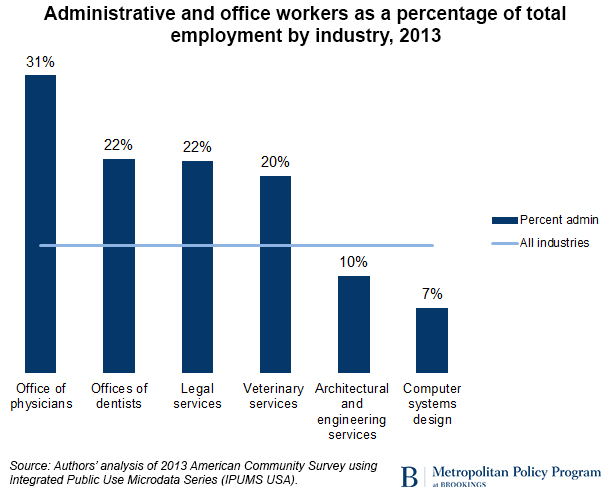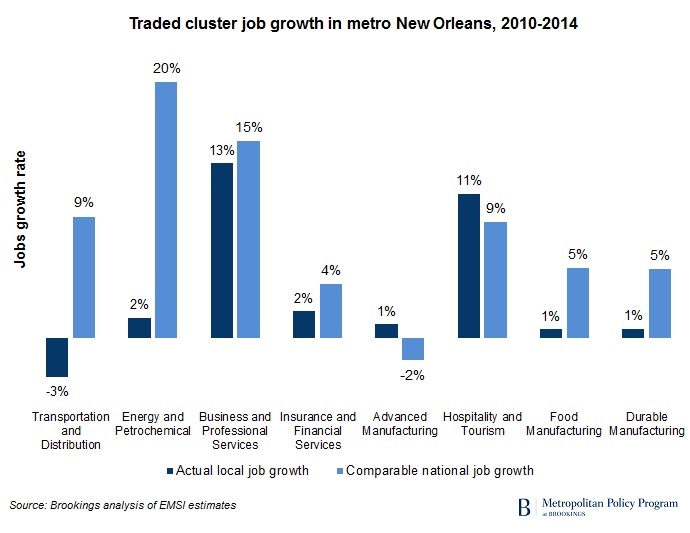With the 10th anniversary of Katrina behind them, leaders in metro New Orleans have declared an end to the region’s period of recovery. Yet challenges remain.
Recent job growth in metro New Orleans has come from low-paying industries, such as hospitality, retail, and administrative services. As in other metro areas, the growth of low-paying work has been accompanied by falling middle-class incomes and rising poverty.
In a new report on “opportunity clusters” in metro New Orleans, we find that efforts to spur more and better jobs in certain segments of the economy could help reverse these trends. We sought to identify occupations and industry clusters that provide “good jobs,” which we define as jobs that could help workers without a four-year degree move into the middle class.
Under this definition, good jobs not only provide stable hours and benefits, but also provide low- and middle-skilled workers with opportunities to advance to higher-paying jobs.
We identified 184,000 good jobs in metro New Orleans in 2014. These good jobs can be found in a variety of occupations and industry clusters. Nearly half are in traded clusters, groups of industries that sell their products and services to customers outside the region. Such industry clusters bring income into the region, driving its growth. Insurance and finance, manufacturing, and transportation and distribution are traded clusters that boast high concentrations of good jobs.

Advanced manufacturing is one traded cluster that represents an especially concentrated and growing source of good jobs in the region. The advanced manufacturing cluster comprises manufacturing industries with high-levels of R&D and a heavy reliance on STEM workers. This cluster employed a total of 7,790 workers in 2014, with two-thirds working in good jobs.
While “advanced” may imply jobs that require extensive education or training beyond the reach of workers without a four-year degree, the advanced manufacturing cluster actually provides good jobs in a variety of occupations that are accessible to low- and middle-skilled workers.
Of these good jobs, the three most numerous in metro New Orleans in 2014 were supervisors of production workers, welders, and inspectors of fabricated products. The cluster also offered good jobs in non-production occupations, such as sales representatives for technical products, maintenance and repair workers, and operations managers.
Although metro New Orleans’ advanced manufacturing cluster has grown slowly, registering job growth of 1 percent between 2010 and 2014, it is one of the few clusters that have grown faster than elsewhere in the United States, as the chart below shows.

This growth has been driven by good jobs. Within advanced manufacturing, good jobs grew by 5.1 percent from 2010 to 2014 while other types of jobs (including low-paying jobs and highly-skilled jobs) collectively contracted by 5.5 percent.
These findings and others in our report suggest that good jobs have been essential to the growth and competitiveness of metro New Orleans’ advanced manufacturing cluster. Good jobs are also essential to the success of other traded clusters in the region. Over 45 percent of jobs in these traded clusters are good jobs, compared to 27 percent of jobs in non-traded parts of the region’s economy.
Ultimately, as our coauthor Amy Liu noted elsewhere, despite metro New Orleans’ progress since the storm even more difficult work lies ahead: diversifying the economy and developing its workforce. Good jobs are key to achieving those goals.


Commentary
‘Good Jobs’ can drive growth and inclusion in metro New Orleans
September 10, 2015